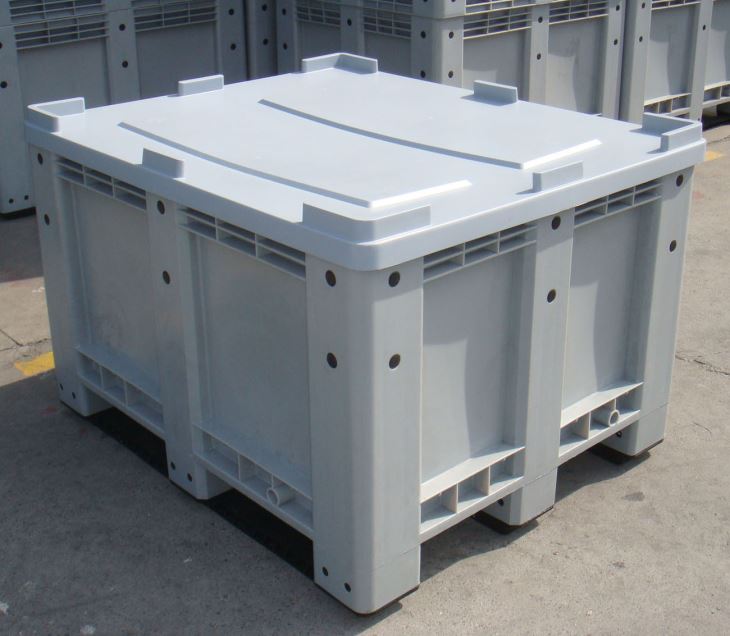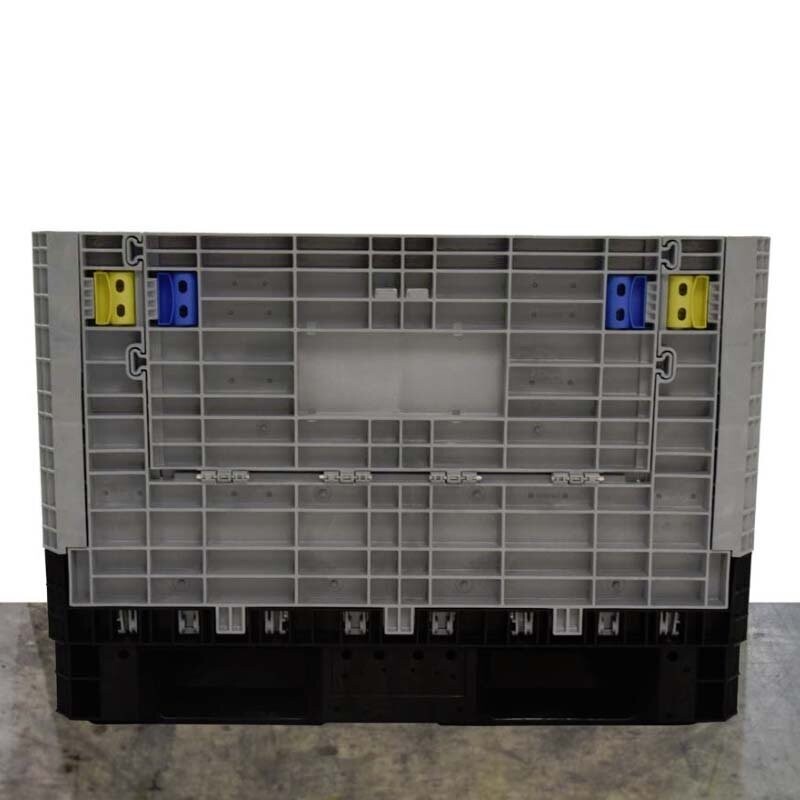The ultimate guide to used bulk containers for transporting goods safely
Wiki Article
The Ultimate Overview to Picking the Right Bulk Containers for Your Business Demands
Picking the appropriate mass containers is critical for any service that relies upon reliable logistics. Numerous sorts of containers exist, each made for specific materials and applications. Variables such as dimension, material compatibility, and governing requirements play a considerable duty in this decision-making procedure. Understanding these elements can result in improved operational efficiency. Nonetheless, several companies ignore crucial elements that could enhance their overall effectiveness and sustainability. What are these factors to consider?Understanding Various Kinds Of Bulk Containers
Mass containers function as necessary devices for services looking for efficient storage and transportation services. These containers are available in different kinds, each designed to fulfill certain functional demands. One common kind is the intermediate bulk container (IBC), which is excellent for fluid and granulated products, using a balance of capability and maneuverability. One more prominent alternative is the bulk bag, or FIBC, suitable for dry, flowable items. These adaptable containers are lightweight and can be easily transferred and kept. For much heavier materials, inflexible bulk containers are commonly utilized, supplying durability and security for risk-free handling. Additionally, there are customized containers customized for harmful products, guaranteeing conformity with safety policies. Understanding the distinct attributes of these mass container kinds allows companies to make educated decisions that optimize logistics and reduce expenses. By selecting the ideal container, firms can improve their operational efficiency and streamline their supply chain procedures.Secret Material Factors To Consider for Bulk Containers
When selecting bulk containers, it is necessary to consider the products made use of in their building. Aspects such as chemical, toughness, and toughness compatibility play an essential function in guaranteeing the containers fulfill particular functional demands. Additionally, weight and mobility problems can influence both efficiency and transportation logistics.Product Toughness and Toughness
Sturdiness and stamina are vital variables in choosing products for bulk containers, as they straight influence the container's capability to hold up against various environmental problems and taking care of procedures. Materials such as high-density polyethylene (HDPE), polypropylene, and stainless steel are frequently favored for their robust properties, supplying resistance to effect, abrasion, and temperature fluctuations. The selection of material additionally affects the overall lifespan of the container; more powerful products generally result in much less regular replacements, leading to cost savings in time. Additionally, the weight of the material can affect shipping expenses and simplicity of handling. Services need to consider their particular functional environments and the capacity for wear and tear to guarantee peak resilience and toughness in their bulk container option.Chemical Compatibility Aspects
Recognizing chemical compatibility is essential for selecting bulk containers, as the materials used should resist the certain materials they will certainly hold. Various aspects affect compatibility, including the chemical nature of the contents, temperature level, and period of storage. For example, destructive chemicals may require containers made from stainless steel or specialized plastics that withstand destruction. In addition, reactive compounds can generate warm or gases, requiring vented or pressure-rated containers. The option of container product, whether polycarbonate, polyethylene, or steel, ought to align with the chemical homes of the stored materials to stop leaks or violations. Inevitably, a detailed analysis of these compatibility factors ensures secure handling and storage space, safeguarding both employees and the setting while keeping product integrity.Weight and Transportability Problems
Choosing bulk containers includes not just reviewing chemical compatibility however likewise considering weight and transportability. Businesses must analyze the convenience of handling and transportation to maximize effectiveness. Light-weight products like high-density polyethylene (HDPE) or light weight aluminum can help with simpler motion and minimize shipping expenses. Conversely, larger containers may provide enhanced longevity but can prevent movement, specifically in atmospheres needing regular moving. In addition, the design of the container need to permit for hassle-free lifting and stacking, ensuring ergonomic safety for employees. Companies must likewise take into consideration the framework readily available for transportation; as an example, containers compatible with forklifts or pallet jacks can improve operations. Inevitably, the best equilibrium between weight and portability straight influences functional efficiency and cost efficiency.Sizing Your Bulk Containers for Optimum Efficiency
When sizing mass containers, companies should thoroughly examine the measurements called for to suit their specific products. Furthermore, weight capability is a vital element that influences efficiency and safety and security throughout transportation and storage. Effective sizing not just optimizes area however likewise optimizes operational workflows.Determining Container Capacities
Selecting the appropriate dimensions for bulk containers is crucial for optimizing effectiveness in storage space and transport. Organizations must examine their details demands, thinking about elements such as offered space, the nature of the goods being stored, and the techniques of transportation used. Accurate dimensions guarantee that containers fit ideally in vehicles and stockrooms, decreasing wasted space and decreasing dealing with time. Standard dimensions can offer comfort, but custom dimensions could be required for special needs or to fit certain products. Additionally, it is very important to evaluate stacking abilities and access, as these elements affect total operational effectiveness. Inevitably, the appropriate measurements bring about boosted organization and streamlined logistics, benefiting the general efficiency of the service.Weight Capacity Considerations
Recognizing weight ability is important for businesses intending to maximize their bulk container performance. The weight ability of a container directly impacts storage abilities, transportation logistics, and general operational prices. Picking containers with the proper weight limits ensures that businesses can securely keep and move their products without risking damage or compliance concerns. Overwhelming containers can lead to architectural failings, while underutilizing ability outcomes in lost resources. When choosing containers, it is essential for companies to analyze their product weights and consider any regulative requirements. Additionally, aspects such as the sort of product, meant use, and environmental conditions must likewise influence weight capacity choices. By assessing these elements, businesses can boost effectiveness and guarantee a streamlined supply chain.Regulatory Conformity and Safety Requirements

Regulatory compliance and safety requirements play a vital role in the choice of bulk containers for companies. Organizations has to guarantee that their containers fulfill various guidelines established by neighborhood, national, and worldwide authorities. These requirements typically refer to material security, architectural honesty, and correct labeling, which help prevent crashes and ensure the safe transportation of items.
In addition, adherence to industry-specific standards, such as those from the Food and Medication Administration (FDA) or the Occupational Security and Wellness Management (OSHA), is critical for companies handling dangerous products or food. Non-compliance can result in fines, lawful issues, or damage to a company's reputation.
Organizations must also think about the container's compatibility with the materials being kept or moved to avoid contamination or chain reaction (used collapsible containers). To summarize, comprehending and applying governing conformity and security standards is important for the liable and click here to read effective use bulk containers
Sustainability Alternatives for Eco-Friendly Mass Containers

Companies are additionally discovering alternatives made from recycled materials, which not just preserve sources but additionally support the recycling sector. Moreover, developments in style permit lighter containers that require less energy to transport, better improving sustainability. By integrating these eco-friendly mass container alternatives, organizations can demonstrate their commitment to environmental stewardship while fulfilling consumer need for lasting methods. This shift not just assists the planet yet can additionally boost brand track record and customer commitment.
Cost-Effectiveness and Budgeting for Bulk Containers
While numerous organizations focus on sustainability, cost-effectiveness remains a critical aspect when choosing mass containers. Organizations must examine the initial acquisition cost, in addition to long-term functional costs, to assure monetary feasibility. Aspects such as maintenance, durability, and reusability play a significant role in identifying overall expenditures.Buying top quality containers might yield higher ahead of time expenses but can result in savings via decreased replacement rates and decreased waste. Furthermore, businesses should take into consideration transport prices and storage effectiveness, as these can influence the overall budget plan.

Often Asked Inquiries
Exactly how Do I Identify the Right Container for Hazardous Products?
To figure out the best container for hazardous products, one have to examine compatibility with the material, take into consideration the container's product, check for governing conformity, and analyze capability and safety and security functions to guarantee appropriate handling and storage.Can Mass Containers Be Customized for Specific Products?
Yes, bulk containers can be customized for specific products. refurbished bulk containers. Various attributes, such as product, design, and dimension, can be tailored to fulfill unique needs, guaranteeing ideal security and effectiveness for delivering and storing different goodsWhat Is the Typical Life Expectancy of Different Bulk Container Types?
The ordinary life-span of bulk container types varies; plastic containers last 5-10 years, steel containers 10-20 years, and wooden containers generally last anonymous 3-7 years, depending upon use, upkeep, and environmental problems.Just how Should I Tidy and Maintain Bulk Containers?
To clean up and keep bulk containers, one should consistently evaluate for damage, get rid of residue, wash with suitable detergents, rinse thoroughly, and assurance correct drying prior to storage. Following maker standards improves durability and security throughout usage.Are There Rental Alternatives for Bulk Containers Available?
Yes, countless business supply rental alternatives for bulk containers, giving adaptability for organizations. These leasings can fit different requirements, allowing companies to take care of supply effectively without the commitment of purchasing containers outright.Toughness and strength are important variables in picking materials for mass containers, as they straight influence the container's capacity to stand up to different ecological conditions and handling processes. Understanding chemical compatibility is necessary for picking mass containers, as the materials made use of must resist the specific pop over here materials they will hold. Understanding weight ability is vital for services intending to enhance their bulk container performance. Regulatory conformity and safety standards play an important duty in the option of mass containers for companies. While many organizations focus on sustainability, cost-effectiveness remains an important factor when selecting bulk containers.
Report this wiki page